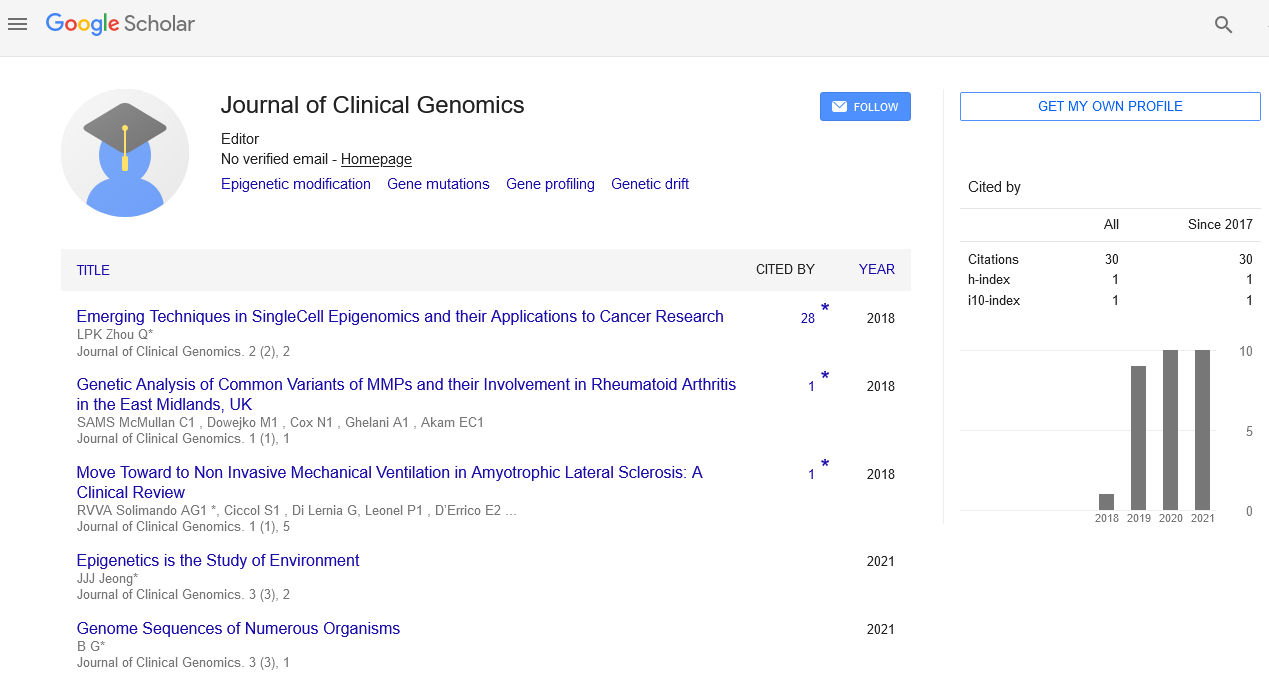Perspective, J Clin Genom Vol: 5 Issue: 4
Examining Genotyping Methods and their Effects in Genetics
Kelleine Drement*
1Department of Biology, Norwegian University of Science and Technology, Trondheim, Norway
*Corresponding Author: Kelleine Drement,
Department of Biology, Norwegian
University of Science and Technology, Trondheim, Norway
E-mail: keliene_drementnust22@gmail.com
Received date: 22 November, 2023, Manuscript No. JCG-24-125698;
Editor assigned date: 24 November, 2023, PreQC No. JCG-24-125698 (PQ);
Reviewed date: 11 December, 2023, QC No. JCG-24-125698;
Revised date: 19 December, 2023, Manuscript No. JCG-24-125698 (R);
Published date: 26 December, 2023, DOI: 10.4172/JCG.1000145
Citation: Drement K (2023) Examining Genotyping Methods and their Effects in Genetics. J Clin Genom 5:4.
Description
The field of genetics has witnessed remarkable advancements over the years, largely propelled by innovative genotyping methods that enable the exploration of the intricacies encoded within the DNA. Genotyping, the process of identifying genetic variations, has become an essential component in genetic studies, influencing diverse areas from disease studies to personalized medicine. It delves into various genotyping methods, examining their processes and the profound effects they exert on expanding the understanding of genetics.
Microarray technology provides a high-throughput approach for genotyping by allowing the simultaneous analysis of thousands to millions of genetic variants. By hybridizing genomic DNA to immobilized probes on a solid surface, microarrays enable the identification of Single Nucleotide polymorphisms (SNPs) and other variations. This method is instrumental in Genome-Wide Association Studies (GWAS), providing insights into the genetic basis of complex traits and diseases.
Polymerase Chain Reaction (PCR) has revolutionized molecular biology, and its applications extend to genotyping. Techniques like Amplification Refractory Mutation System (ARMS) and Restriction Fragment Length Polymorphism (RFLP) leverage PCR to amplify specific DNA regions. By analyzing the resulting fragments, analysts can identify genetic variations, including point mutations and insertions or deletions.
Next Generation Sequencing (NGS) technologies have transformed genotyping by enabling comprehensive DNA sequencing. Whether through Sanger sequencing or advanced NGS platforms, this approach provides high-throughput, accuracy, and the ability to identify a spectrum of genetic variations, from SNPs to large structural changes. It has become a staple in genomics studies and clinical diagnostics.
This method relies on the specific binding of short DNA probes to target sequences. Designed to selectively hybridize with different alleles, these probes enable the identification of specific genetic variants. This technique is valuable for detecting point mutations and small insertions or deletions. Mass spectrometry, through methods like MALDI-TOF, analyzes the mass and charge of molecules. In genotyping, it is employed to measure the mass of DNA fragments, providing information about the genetic variants present. This highthroughput method is particularly useful for large-scale genotyping studies. Genotyping has transformed the landscape of medicine by enabling precision approaches. In pharmacogenomics, genotyping identifies genetic variations influencing drug metabolism and response.
Tailoring treatments based on individual genetic profiles enhances therapeutic outcomes and minimizes adverse effects. The effects of genotyping methods are evident in disease association studies. By identifying genetic markers associated with diseases through techniques like GWAS, experts gain vital insights into the genetic basis of disorders. This knowledge informs early diagnosis, treatment strategies, and the development of targeted therapies. Genotyping methods play a pivotal role in unraveling the genetic history of populations. Studying genetic variations allows experts to trace human migration patterns, understand adaptation to different environments, and explore the impact of natural selection. These insights contribute to the understanding of human evolution. Agriculture benefits from genotyping methods through precision breeding.
By identifying genetic variations associated with desirable traits in crops, such as disease resistance or increased yield, analysts can develop cultivars tailored to specific environmental conditions. This precision enhances agricultural sustainability and global food security. Genotyping is a powerful tool in forensic genetics for individual identification. DNA profiling, based on genotyping methods, is essential in criminal investigations, helping solve cases and establish familial relationships. The accuracy and reliability of genotyping contribute significantly to the justice system.
Conclusion
In conclusion, examining genotyping methods and their effects in genetics reveals a transformative impact on the understanding of the genetic code. From unraveling the genetic basis of diseases to facilitating precision medicine and contributing to agricultural advancements, genotyping methods have become indispensable in diverse experiments in science. As technology continues to evolve, these methods will likely play an even more central role in shaping the future of genetics, providing new avenues for innovations, diagnostics, and personalized interventions. The exploration of the genetic landscape, facilitated by genotyping, continues to unlock the mysteries encoded in the DNA, paving the way for revolutionary findings and applications in the realms of health, agriculture, and beyond.
 Spanish
Spanish  Chinese
Chinese  Russian
Russian  German
German  French
French  Japanese
Japanese  Portuguese
Portuguese  Hindi
Hindi 